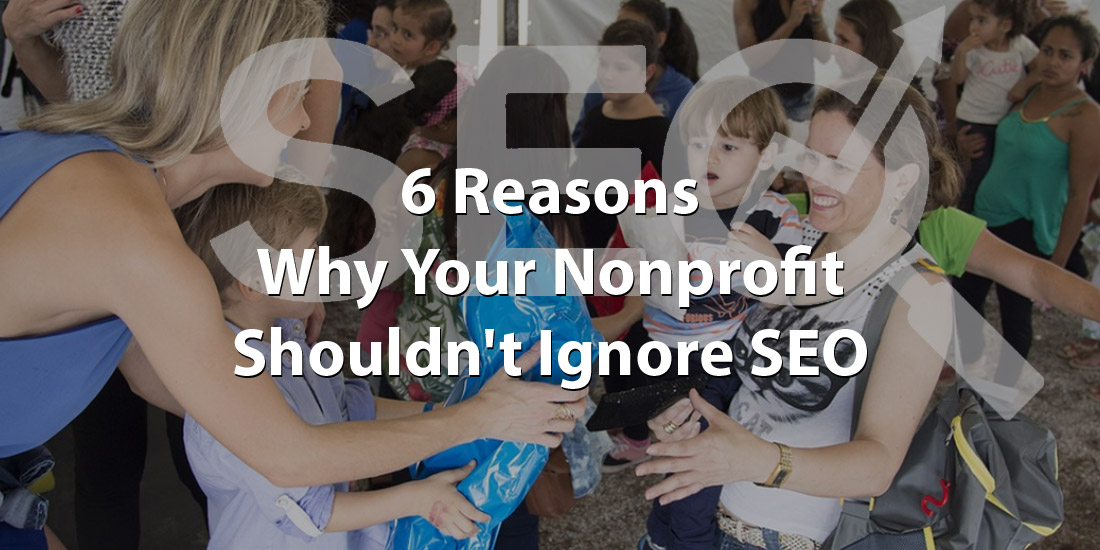Search Engine Optimization, or SEO, can seem daunting and complicated, especially to organizations with resource and time constraints in learning about it. Although nonprofits might especially struggle with SEO, it’s worth investing in small changes that can lead to big gains in your efforts both toward your cause and general increases in your site’s traffic.
Contents
Here are seven reasons how SEO can work in your nonprofit’s favor:
-
Use popular keywords, not creative original phrases
Choose your words wisely. Picking the right keywords can be the difference between being found or being forgotten.
Creativity can be fun and might even appeal to your audience. If you want to use a unique phrase that people will associate with your organization to differentiate and stand out from the crowd, be careful how you apply this strategy. Your success hinges on your ability to educate your audience on that unique keyword, often using paid mediums to drive traffic to your website. Most non-profits don’t have exhaustive budgets to apply this kind of strategy, so picking a keyword that nobody uses could result in less exposure for your content in search engine results. So your stellar content won’t reach as many potential supporters!
-
Use SEO to make content marketing effective
It pays to know how your audience thinks and conducts search queries on Google and other search engines. For example: Do people search for ‘kids movies’ or ‘children’s movies’, ‘kids books’ or ‘children’s books’? Why does it matter?
Take a look below and consider why it matters:
This indicates a significant difference in the potential traffic that you can drive to your site when ranking for ‘kids movies’, versus ranking for ‘children’s movies’.
Note about that, while ‘kids movies’ is a popular search term, ‘children’s books’ is the highest searched term for books.
Doing keyword research can reveal nuances in people’s preferred searches that you might not expect. Making small adjustments to your website content in line with these nuances can render your website more discoverable to potential supporters online.
-
SEO research will improve your understanding of your audience
Trends change, languages evolve, the way people talk and the popular terms they use are never static. Be proactive in your knowledge of the latest trends and take advantage of new opportunities by keeping your site content up to date to prevent a potential drop in traffic.
Above is an example in the education sector for the term ‘common core’. Despite its growing popularity in recent years, it is currently undergoing a slow decline and might be replaced in the not too distant future.
Conducting keyword research and analysis of what people are searching on your site* will help you determine which topics your audience is the most interested in. Your research could lead to discovery of new topics or new angles on topics that you already have expertise on. Creating content based on these topics can drive additional organic traffic to your website from people actively looking for your content who are likely more interested in your cause.
It can also be helpful to think ahead, informed by your knowledge of your industry. What keywords to you anticipate rising in popularity in the near future? What trends do you anticipate to take hold in the coming months or year?
*Discover what people are searching for on your site using the ‘search terms’ report in Google Analytics.
-
SEO helps identify what content is driving your traffic
In Google Search Console, you can discover which pages currently drive the most traffic to your site, what your average ranking position is, how many people see your site, and how many click through to your site. Review your top fifty pages and keywords. If you rank on the first search results page on Google but your click-through-rate is low, consider trying the following:
- Update your meta content to rank higher on the page and/or appeal to users to entice them to click on your content
- Adjust your landing page to be more relevant to the search query.
- If you are ranking for some terms that don’t make sense for your organization at all, adjust some of the wording on your page to avoid getting unwanted traffic. You should be targeting an audience that’s eager to land on your page.
-
Neglecting SEO means someone else can take advantage
Being aware of and in control of your search rankings not only helps boost your presence but also is a proactive approach against others who might take advantage. Consider this circumstance especially for nonprofits that promote an issue that some consider controversial, and imagine this scenario:
An article is published to make your organization look bad. Even after three years, the article still appears at the top of the first search results page when someone runs a search query for your cause’s brand name today. Press articles (regardless of accuracy or fairness) can linger online for years because their main domains tend to have high credibility. Your efforts to reach out to the publisher yield no results when they are unwilling to take down the article. So now you’re left trying to outrank these kinds of articles on Google with your new content, a huge challenge given the time and effort it takes to compete with some of these established and credible sources.
Because of this kind of scenario, we encourage proactivity when managing your organization’s online reputation. Recognize how you can influence the content that ranks high in searches for your brand name and how you can be an active participant in conversations you and your audience care about.
-
Your efforts will go nowhere if nobody can find you
Make yourself as discoverable as possible to potential supporters by using words that your audience is using. To reiterate an earlier statement: the best way to determine which keywords to use is through keyword research.


